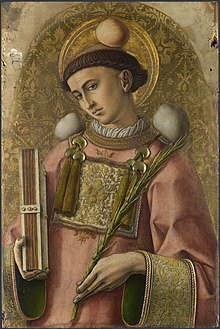
Back ቅዱስ እስጢፋኖስ ሊቀ ዲያቆናት ወቀዳሜ ሰማዕት Amharic إسطفانوس Arabic ܡܪܝ ܐܣܛܦܢܘܣ ARC استفانوس ARZ Стефан (светец) Bulgarian Stefan (kentañ merzher) Breton Esteve màrtir Catalan Svatý Štěpán Czech Steffan (sant) Welsh Sankt Stefan Danish
Stephen | |
|---|---|
 Saint Stephen by Carlo Crivelli | |
| Deacon, Archdeacon Apostle of the Seventy Protomartyr of the Faith First Martyr | |
| Born | c. AD 5 |
| Died | 33–36 (aged 28–32) Jerusalem, Judaea, Roman Empire |
| Venerated in | Roman Catholic Church Eastern Catholic Churches Orthodox Church Oriental Orthodox Churches Assyrian Church of the East Anglican Communion Lutheranism |
| Canonized | Pre-Congregation |
| Feast | 25 December (Armenian Apostolic Church) 26 December (Western) 27 December, 4 January, 2 August, 15 September (Eastern) Tobi 1 (Coptic Christianity) |
| Attributes | Red Martyr, stones, dalmatic, censer, miniature church, Gospel Book, martyr's palm. In Orthodox and Eastern Christianity he often wears an orarion |
| Patronage | Altar servers[1];Acoma Native American Pueblo; Bricklayers; casket makers; Cetona, Italy; deacons; headaches; horses; Kessel, Belgium; masons; Owensboro, Kentucky; Passau, Germany; Kigali, Rwanda; Dodoma, Tanzania; Serbia; Ligao; Republic of Srpska; Prato, Italy [1] |
Stephen (Greek: Στέφανος, translit. Stéphanos, lit. "wreath, crown", and by extension 'reward, honor, renown, fame', often given as a title rather than as a name; c. AD 5 – c. 34) is traditionally venerated as the protomartyr or first martyr of Christianity.[2] According to the Acts of the Apostles, he was a deacon in the early church at Jerusalem who angered members of various synagogues by his teachings. Accused of blasphemy at his trial, he made a speech denouncing the Jewish authorities who were sitting in judgment on him[3] and was then stoned to death. Saul of Tarsus, later known as Paul the Apostle, a Pharisee and Roman citizen who would later become an apostle, participated in Stephen's martyrdom.[4]
The only source for information about Stephen is the New Testament book of the Acts of the Apostles.[5] Stephen is mentioned in Acts 6 as one of the Greek-speaking Hellenistic Jews selected to administer the daily charitable distribution of food to the Greek-speaking widows.[6]
The Catholic, Anglican, Oriental Orthodox, Eastern Orthodox, and Lutheran churches and the Church of the East view Stephen as a saint.[7] Artistic representations often show Stephen with a crown symbolising martyrdom, three stones, martyr's palm frond, censer, and often holding a miniature church building. Stephen is often shown as a young, beardless man with a tonsure, wearing a deacon's vestments.
- ^ "Totus2Us".
- ^ "St. Stephen the Deacon" Archived 12 December 2013 at the Wayback Machine, St. Stephen Diaconal Community Association, Roman Catholic Diocese of Rochester.
- ^ Acts 7:51–53
- ^ Acts 22:20
- ^ Souvay, Charles. "Saint Stephen". Catholic Encyclopedia,1912. New Advent. Retrieved 3 April 2013.
- ^ Mal Couch, A Bible Handbook to the Acts of the Apostles, 2003, p. 246. "Stephen is distinguished as "a man full of faith and of the Holy Spirit" (Acts 6:5). Stephen and the other men were Hellenistic Jews whose native language was Greek. He had lived with Gentiles in other parts of the Roman Empire."
- ^ "Article XXI (IX) Of the Invocation of the Saints".
© MMXXIII Rich X Search. We shall prevail. All rights reserved. Rich X Search